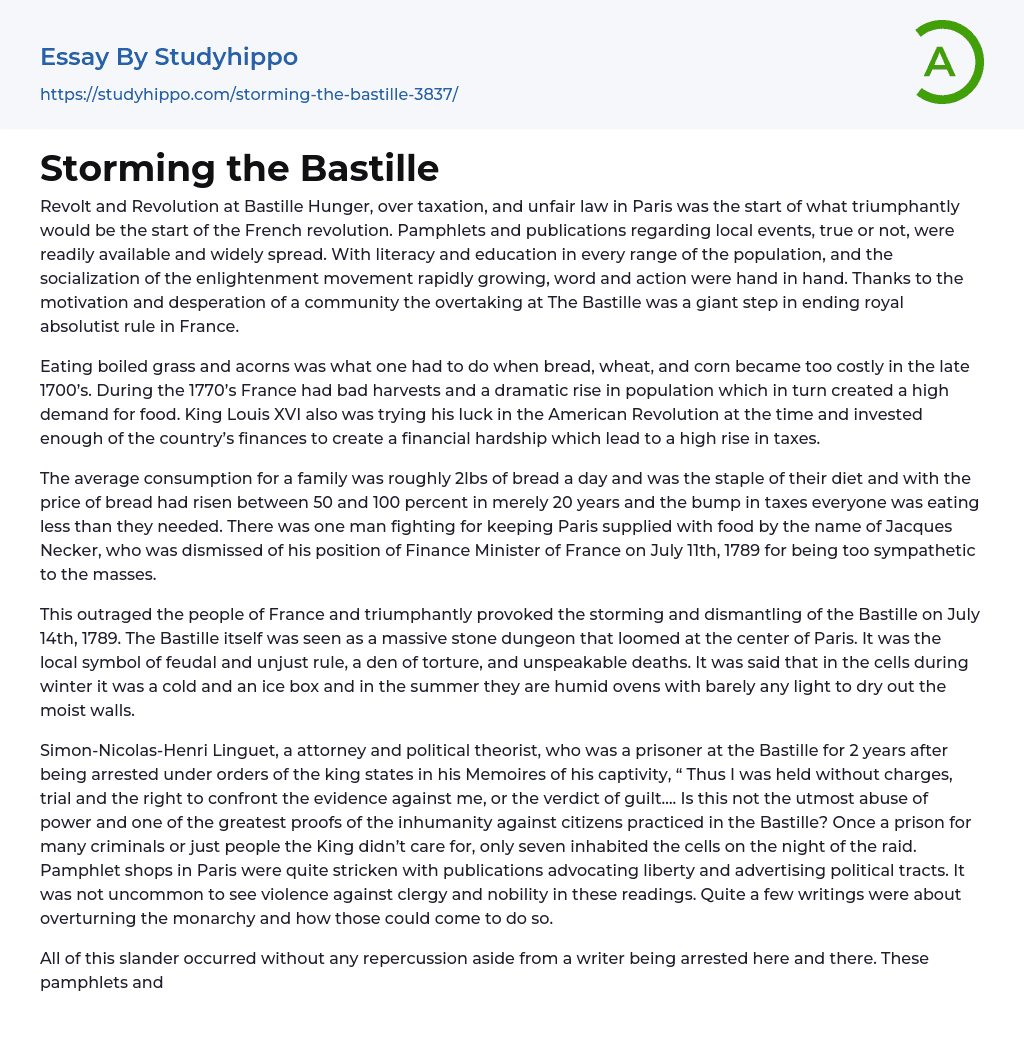Revolt and Revolution at Bastille Hunger, over taxation, and unfair law in Paris was the start of what triumphantly would be the start of the French revolution. Pamphlets and publications regarding local events, true or not, were readily available and widely spread. With literacy and education in every range of the population, and the socialization of the enlightenment movement rapidly growing, word and action were hand in hand. Thanks to the motivation and desperation of a community the overtaking at The Bastille was a giant step in ending royal absolutist rule in France.
Eating boiled grass and acorns was what one had to do when bread, wheat, and corn became too costly in the late 1700’s. During the 1770’s France had bad harvests and a dramatic rise in population which in turn created
...a high demand for food. King Louis XVI also was trying his luck in the American Revolution at the time and invested enough of the country’s finances to create a financial hardship which lead to a high rise in taxes.
The average consumption for a family was roughly 2lbs of bread a day and was the staple of their diet and with the price of bread had risen between 50 and 100 percent in merely 20 years and the bump in taxes everyone was eating less than they needed. There was one man fighting for keeping Paris supplied with food by the name of Jacques Necker, who was dismissed of his position of Finance Minister of France on July 11th, 1789 for being too sympathetic to the masses.
This outraged the people of France and triumphantly provoked the storming and dismantling of the Bastille o
July 14th, 1789. The Bastille itself was seen as a massive stone dungeon that loomed at the center of Paris. It was the local symbol of feudal and unjust rule, a den of torture, and unspeakable deaths. It was said that in the cells during winter it was a cold and an ice box and in the summer they are humid ovens with barely any light to dry out the moist walls.
Simon-Nicolas-Henri Linguet, a attorney and political theorist, who was a prisoner at the Bastille for 2 years after being arrested under orders of the king states in his Memoires of his captivity, “ Thus I was held without charges, trial and the right to confront the evidence against me, or the verdict of guilt…. Is this not the utmost abuse of power and one of the greatest proofs of the inhumanity against citizens practiced in the Bastille? Once a prison for many criminals or just people the King didn’t care for, only seven inhabited the cells on the night of the raid. Pamphlet shops in Paris were quite stricken with publications advocating liberty and advertising political tracts. It was not uncommon to see violence against clergy and nobility in these readings. Quite a few writings were about overturning the monarchy and how those could come to do so.
All of this slander occurred without any repercussion aside from a writer being arrested here and there. These pamphlets and writings stirred the pot at coffee shops and salons across France especially at Palais Royal. Given that even the most well off citizens had to pay more in taxes than the poor, this common thought was a
bond between all tax payers. At Palais Royal the meeting and social events that took place often stirred up a large gathering of the community not only to voice their opinion.
Arthur Young, a wealthy Englishman states in his travel journal, “ I am all amazement at the ministry permitting such nests and hot-beds of sedition and revolt, which disseminate amongst the people, every hour, principles that must be opposed with vigor and therefore it seems little short of madness to allow the propagation at present. ” The spirit of the people was growing and they were becoming restless and hungrier by the day. With being able to publicly meet in this fashion it comes to no surprise that an organized revolt occurred so seamlessly. All this while King Louis XVI was off hunting in Versailles.
Due to the revolution at Bastille, The Declaration of the Rights of Man was issued and equal rights for all man were finally achieved. Also, freedom of press was opened up and not repressed by royalty which dictated a lot of the time what could be published. The Vainqueurs de la Bastile, who were considered the ones who fought for the ammo and gun powder which ended up bringing down the fortress were paid and honored for their heroism. The French Revolution had begun with this small conquering and will end with new and improved rights for the people and a new flag for the country.
- Business Law essays
- Contract essays
- Consumer Protection essays
- Property essays
- Ownership essays
- Agreement essays
- Common Law essays
- Contract Law essays
- Justice essays
- Security essays
- Tort Law essays
- United States Constitution essays
- Crime essays
- Lawsuit essays
- Treaty essays
- Family Law essays
- Marijuana Legalization essays
- Constitution essays
- War on Drugs essays
- Court essays
- Jury essays
- Police essays
- Protection essays
- Community Policing essays
- Criminal Law essays
- Judge essays
- Lawyer essays
- Employment Law essays
- Copyright Infringement essays
- Injustice essays
- Intellectual Property essays
- Breach Of Contract essays
- Jurisprudence essays
- Social Injustice essays
- Juvenile Justice essays
- Internet Privacy essays
- Cyber Security essays
- Bill Of Rights essays
- Civil Liberties essays
- First Amendment To The United States Constitution essays
- Fourth Amendment To The United States Constitution essays
- Second amendment essays
- Animal Cruelty essays
- Law Enforcement essays
- Juvenile Justice System essays
- Surveillance essays
- Forensic Science essays
- Crime Prevention essays
- Criminal Justice essays
- Criminology essays




